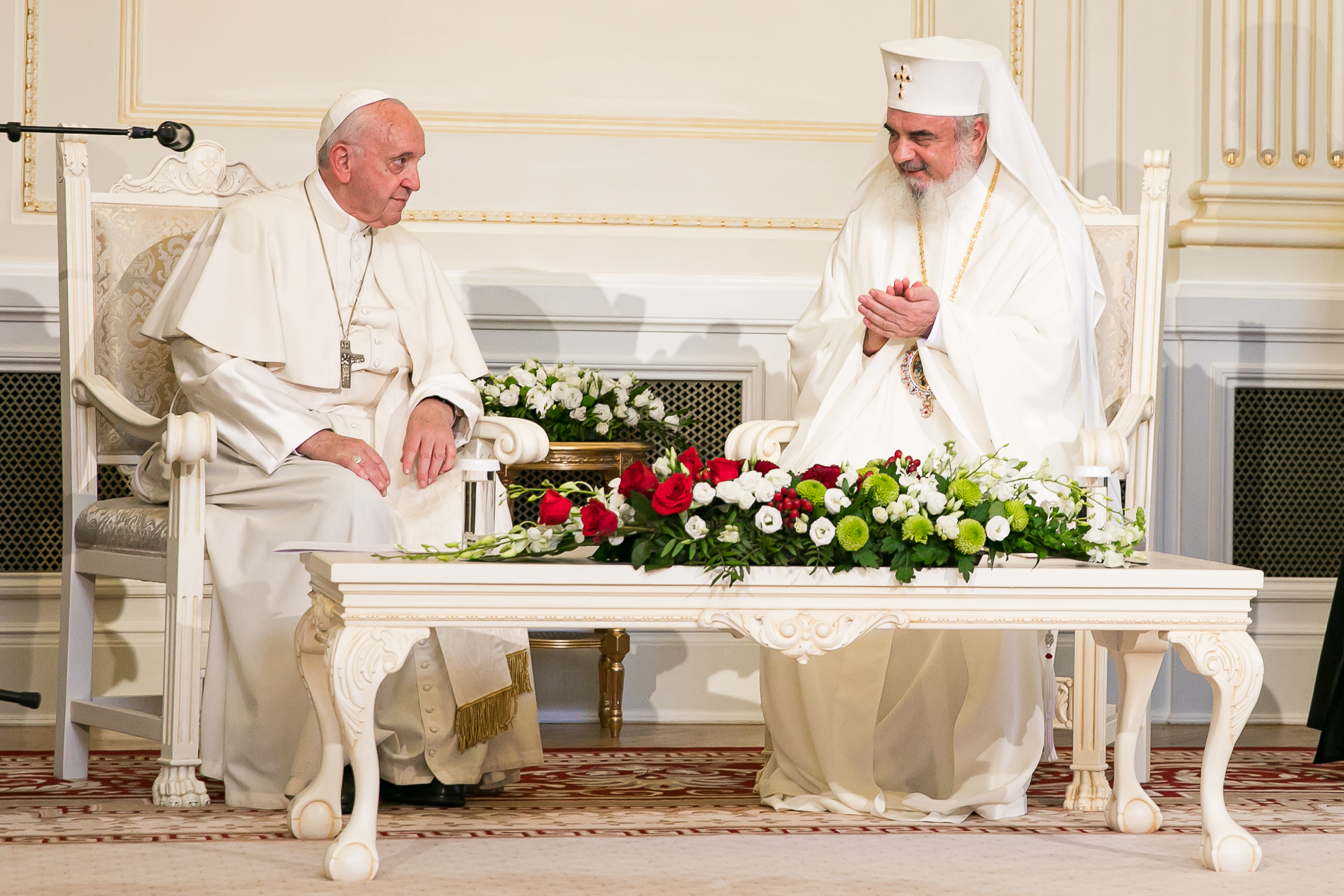
Last
week marked one year since Pope Francis visited for the first time
Romania and met with Patriarch Daniel and other members of the Holy
Synod of the Romanian Orthodox Church.
During the visit and immediately afterwards, Pope Francis expressed
his deep appreciation for Romania and the Romanians living in Italy, for
the National Cathedral and, last but not least, for His Beatitude
Patriarch Daniel.
A year later, it is an excellent opportunity to remember the most important things about his visit.
- Pope Francis came as a pilgrim.
In this capacity he visited the National Cathedral, on which occasion Patriarch Daniel said:
‘Today, we welcome you as a pilgrim in this new Cathedral, in which above the Altar (Sanctuary) there is a large mosaic icon of the Mother of God, named in the Greek language “Platytera”, and in the Latin language Regina Coeli.’
- Pope Francis paid tribute to the contribution that the Romanian diaspora brings to Italian society.
“I pay homage to the sacrifices endured by so many sons and daughters of Romania who, by their culture, their distinctive identity and their industriousness, have enriched those countries to which they have emigrated, and by the fruit of their hard work have helped their families who have remained at home.”
- Pope Francis was welcomed at the Patriarchal Palace in the same room as Pope John Paul II.
- Patriarch Daniel spoke of three vulnerabilities in the global society that require response and action from Christians: secularisation, family, and poverty.
- “Today, our predecessors also call upon us to defend and promote the faith in Christ and the Christian values in a very secular Europe, to convey to the younger generation the faith in the merciful love of Christ for the world and the faith in the eternal life of the human person.”
- “At the same time, they call us to bear witness, defend and promote the traditional Christian family made up of a man, a woman and children, in a Europe marked by a clear demographic decline, a continent rapidly ageing.”
- “The preaching of the Gospel of Christ calls us today to unite the Liturgy with philanthropy, prayer with social action in helping the poor, sick and marginalised people.”
- The two religious leaders evoked the anti-Christian communist persecution.
“Here, as in so many other places nowadays, you have experienced the Passover of death and resurrection. Many sons and daughters of this country, from various churches and Christian communities, knew the Friday of persecution, endured the Saturday of silence and experienced the Sunday of rebirth. How many were the martyrs and confessors of faith!”Later, in his speech at the National Cathedral, Patriarch Daniel also spoke about this topic:
“The new National Cathedral is a symbolic edifice of the Resurrection of the demolished churches and also a symbol of the religious freedom of the Romanian people after almost 50 years of communist regime.”
- Pope Francis and Patriarch Daniel stressed the excellent ties between the Romanian Catholic and Orthodox communities in Italy.
“A good example is the so many Romanian Orthodox communities that collaborate very well with many Catholic dioceses in Western Europe where they are present. In many cases, a relationship of reciprocal trust and friendship has developed, nurtured by concrete gestures of acceptance, support and solidarity.”In his speech at the National Cathedral, His Beatitude Father Daniel confirmed the excellent relationship between the two communities:
“Thank you for your constant support of Romanian Orthodox believers in Italy and other countries, where the Roman Catholic Church has provided 426 places of worship, 306 in Italy and 120 in other Western European countries to Romanian Orthodox communities.”
- Patriarch Daniel remembered that Pope John Paul II offered $ 200,000 for the Romanian People’s Salvation Cathedral.
- The intonation of Our Father, proposed by the Catholics, was accepted as a sign of gratitude for the support offered to the National Cathedral and Orthodox Romanians in Italy.
- On his return, Pope Francis praised Patriarch Daniel: “You have a great Patriarch”.
‘You have a great patriarch, a man of great heart, a great scholar, he knows the mysticism of the Desert Fathers, the spiritual mysticism, he studied in Germany and is also a man of prayer. It’s easy to get close to Daniel; we talked like brothers,’ the Pope said as cited by Vatican News.
Pope Francis paid a three-day visit to Romania last year making it his 30th Apostolic Journey abroad. He followed in the footsteps of Pope John Paul II, who made the first papal visit to the Orthodox-majority nation 20 years ago in May 1999.
Photography courtesy of Basilica.ro / Mircea Florescu
Follow us on Twitter: @BasilicaNews
